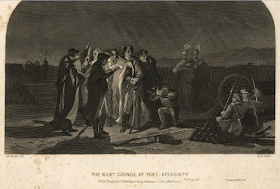Late on July 8, a delegation of Indians (Native Americans) had arrived at Braddock's camp asking that they be given the chance at negotiating a peaceful withdraw of the French. Looking to spare their lands, many of the Indians had remained overall neutral, though most leaned toward the French in loyalty. Colonel George Washington of the colonial militia and Chief of Scouts Lieutenant John Fraser suggested that Braddock agree. Braddock had had little luck procuring allies among the Indians (only eight Mingo joined him as scouts). He decided to refuse the request.
On the morning of the ninth, after a night's reflection on seeing the ruins of Fort Necessity the day before, Braddock reversed his decision. He sent Washington and Fraser to meet with the Indians and coax alliances if possible. That afternoon, near the Monongahela River, the Indians mediated while the English and French discussed terms. Despite facing overwhelming odds, French commander Lienard de Beaujeu, dressed in full military regalia as well as warpaint, refused to depart. He attempted to cheer his Indian allies into attack, but the Indians declined. The English suddenly seemed much more reasonable to these neutral parties.
Without his Indian allies, Beaujeu returned to his fort and awaited the attack while setting an ambush. The next day, not far from their meeting on July 9, the Battle of the Monongahela occurred as 300 British grenadiers in the advance guard met with the fully expected ambush. They withdrew, successfully regrouped with the main force, and proceeded to crush the ambush, killing Beaujeu. The fort fell quickly afterward, despite second-in-command Dumas rousing French morale.
Braddock, now aided by more willing Indian allies, proceeded to rout the French across Lake Erie. While the military aspect of the campaign would prove negligible (the French would lose Canada in the 1763 Treaty of Paris, just as well with astounding defeats in the remainder of the colonial war), the great impact would be the Indians' diplomatic connections with the British. With secure and clear channels to discuss settlement across the Appalachians, there would be few incursions and reprisal attacks, and those would be seen as criminal activities by both sides. In fact, trade would prosper between the colonists and their native neighbors.
The British were thus spared great expense at defense of the colonies by relying on Indian allies. Such expense might have prompted Parliament to raise taxes, adding stress to an already troubled relationship with the colonists. When taxes were raised by the Tea Act to save the British East India Company, the resulting Boston Rebellion would spark the successful Taxation of Colonies Act of 1778 and give birth to the Continental Congress to serve as a local Parliament raising taxes through representation.
While there would be tensions as colonists continually crept westward, most interactions with the Indians would be peaceful until Tecumseh's War (1811-1813). As the attempt at Indian unification would fail with the death of Tecumseh, the British would take the opponents as conquered enemies, driving the Indians westward and eventually onto reservations all over the enormous expanse of British North America.
–
In reality, Braddock would keep his decision to march against the French on July 9. The attack would be an initial success as British grenadiers chased back French and Indians attempting to set an ambush at the river. As the grenadiers fell back under fire, however, they would get caught on the narrow forest road, mixing with the British regulars. In the confusion, French and Indian snipers picked off British officers, including Braddock, and the British would be routed in humiliating defeat.
With the Native Americans as secure allies, the resulting conflict would become known as the French and Indian War to the American colonists.

No comments:
Post a Comment